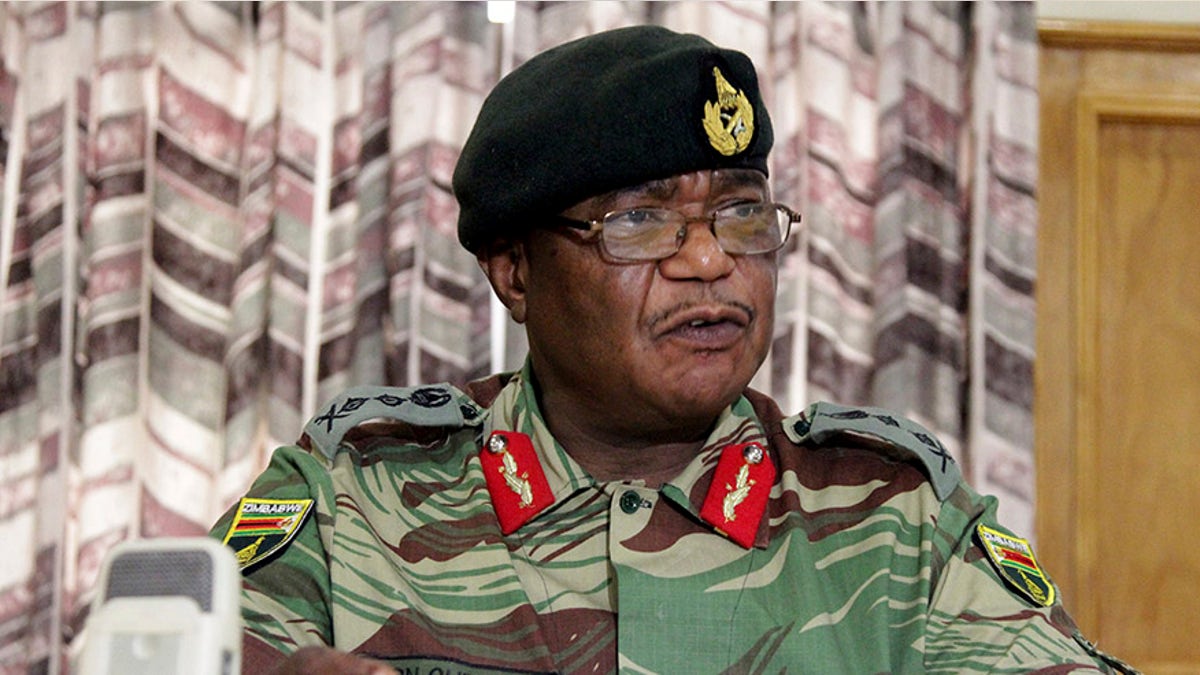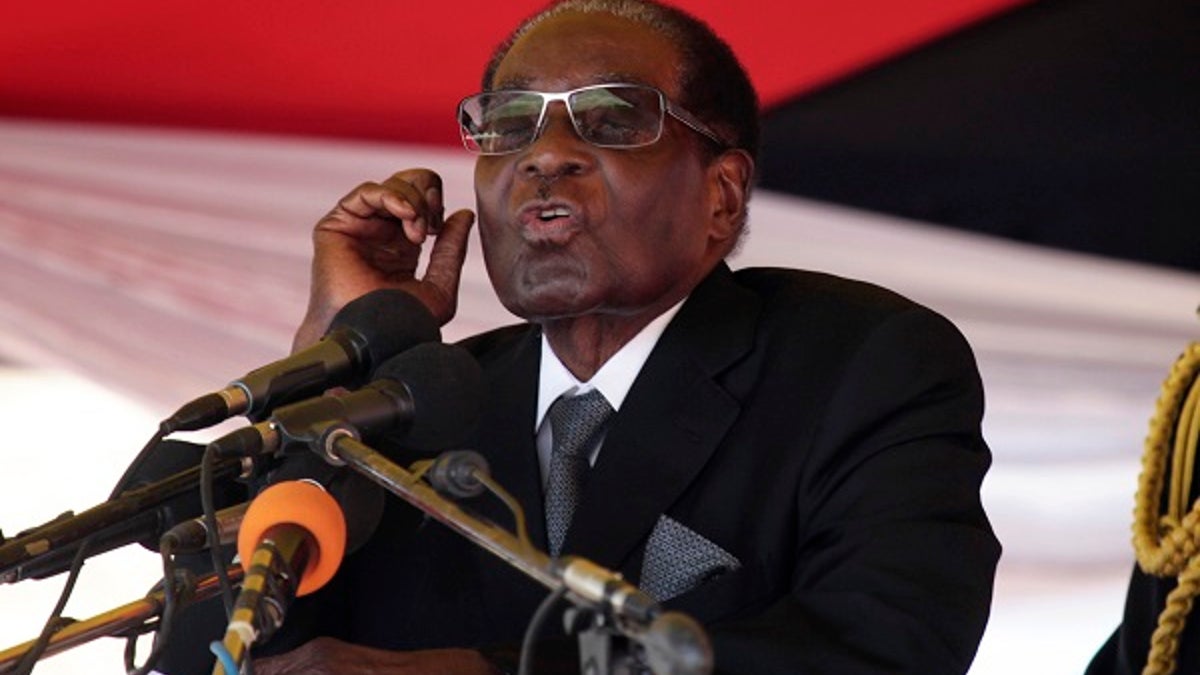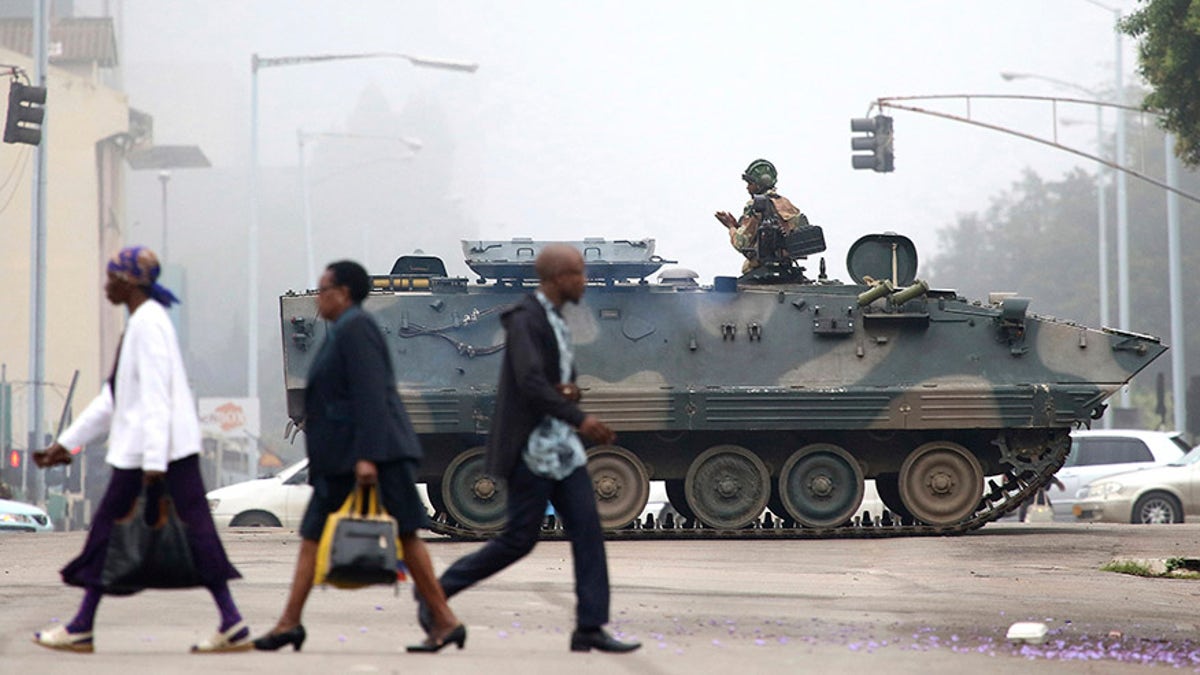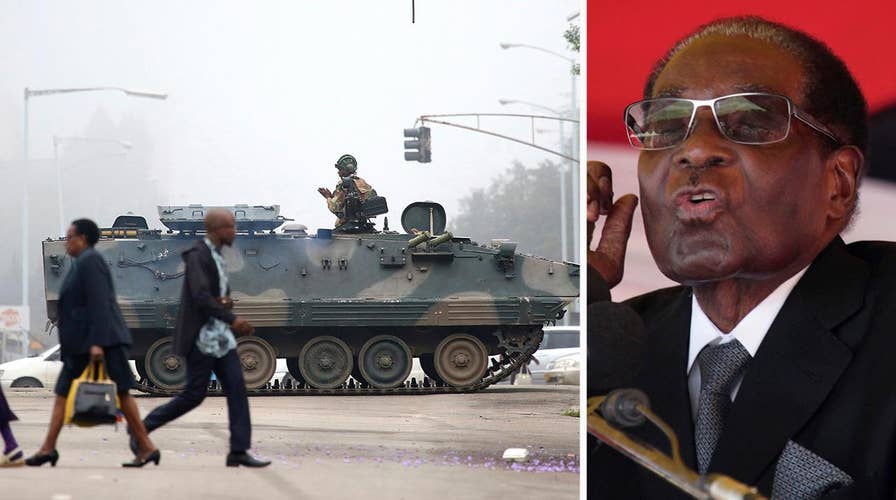Longtime Zimbabwe President Mugabe under house arrest
Americans told to shelter in place amid apparent coup attempt.
President Robert Mugabe’s 37-year reign of Zimbabwe appears to be coming to an end after the southern African country’s army seized control of the parliament and the state broadcaster and put the 93-year-old and his wife into home confinement.
The actions by the military early Wednesday triggered widespread speculation of a military coup. Army officials denied the claim, saying it was a “bloodless correction” of the nation’s current political order.
Military spokesman Maj. Gen. Sibusiso Moyo said assured the public that Mugabe and his wife, Grace, were safe and sound. He said during an early morning address to the nation that “the situation in our country has moved to another level.”

Zimbabwe's army commander, Constantino Chiwenga, leading the military action in the country. (Associated Press)
“We wish to make it abundantly clear that this is not a military takeover,” he said. “We are only targeting criminals around [Mugabe] who are committing crimes that are causing social and economic suffering in the country in order to bring them to justice.”
Moyo added that “as soon as we have accomplished our mission, we expect that the situation will return to normalcy” and urged the country to remain calm, while warning that “any provocation will be met with an appropriate response.”
South Africa and other neighboring countries are sending in leaders to negotiate with Mugabe and the generals to encourage the transition.
Armed soldiers in armored personnel carriers stationed themselves at key points in Harare, while Zimbabweans formed long lines at banks in order to draw the limited cash available, a routine chore in the country's ongoing financial crisis. People looked at their phones to read about the army takeover and others went to work or to shops.
"I am just following what is happening on WhatsApp but I am still in the dark about what is happening," said Felix Tsanganyiso, who sells mobile airtime vouchers. "So far so good; we are going about our business without harassment. My plea is that whoever takes over should sort out the economy. We are tired of living like this."

Robert Mugabe, 93, has ruled Zimbabwe since the end of white-majority rule in the 1980s. (Associated Press)
The once prosperous nation is now facing nearly 90 percent unemployment.
The U.S. Embassy closed Wednesday, with the U.S. urging its citizens in Zimbabwe to shelter in place, claiming “the ongoing political uncertainty through the night.” The British Embassy also issued a similar alert to its citizens.
The developments Wednesday followed Mugabe’s firing last week of his deputy Emmerson Mnangagwa, accusing him of plotting to take power, including through witchcraft.
Many saw the move a way to position the first lady, Grace Mugabe, as one of the country’s two vice presidents at a party conference next month.

An armed soldier patrols a street in Harare, Zimbabwe, Wednesday, Nov. 15, 2017. Zimbabwe's army said Wednesday it has President Robert Mugabe and his wife in custody and is securing government offices and patrolling the capital's streets following a night of unrest that included a military takeover of the state broadcaster. (AP Photo) (Copyright 2017 The Associated Press. All rights reserved.)
However, the first lady is unpopular among many Zimbabweans for her lavish spending on mansions, cars and jewels. Last month she went to court to sue a diamond dealer for not supplying her with a 100-carat diamond that she said she had paid for.
Grace Mugabe, 52, has been known as the leader of the G40, a group of Cabinet ministers and officials in their 40s and 50s who are too young to have fought in Zimbabwe's war to end white-minority Rhodesia. When Mnangagwa was fired, the generals and war veterans felt they were being sidelined and took action to stop that, analysts say.
The whereabouts of Mnangagwa were unclear Wednesday as he fled the country after his firing citing threats to him and his family.
After Mnangagwa’s firing, army commander Constantino Chiwenga issued an unprecedented statement saying purges against senior ruling ZANU-PF party officials, many of whom like the former vice president fought for liberation, should end "forthwith."
"We must remind those behind the current treacherous shenanigans that when it comes to matters of protecting our revolution, the military will not hesitate to step in," the army commander said.
Analysts believe who will rule in Zimbabwe will be determined in the coming days.
"There is a soft transition underway," said Zimbabwean analyst Alex Rusero. "The whole idea is that the military has always been the chief broker in (Mugabe's ruling party) ZANU-PF ... But there were attempts to sideline the military by G40 and they (the military) are reasserting their position."
Mnangagwa may well be installed as a transitional leader to return Zimbabwe to constitutional rule, Rusero said.
Zimbabwe may enter a period of negotiation to get Mugabe to step down voluntarily, said Piers Pigou, southern Africa consultant for the International Crisis Group, who also suggested that Mnangagwa may be an interim leader.
"Zimbabwe could have some kind of inclusive government and some kind of democratic process, possibly leading to elections," Pigou said. "It's clearly a coup d'etat, but typical of Zimbabwe, the military is trying to put a veneer of legality on the process. ... It is part of the theater that Zimbabwe is so good at, to try to make things look orderly and democratic. South African and other neighboring countries may be brought in to help put some lipstick on the pig."
The Associated Press contributed to this report.

